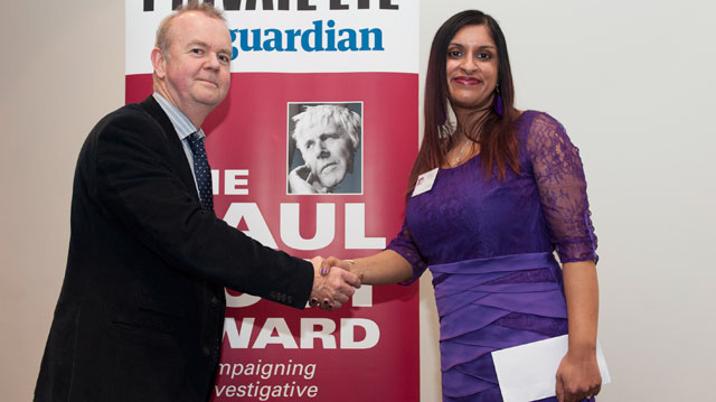
Aasma Day’s determination to get out of the office to meet and talk to real people has led to a trophy cabinet full of journalism awards.
But the Lancashire Post reporter reckons no stories will be as moving or as memorable as the Preston ‘twilight investigation’ that looked at the hidden world of those trapped on the margins of society.
This saw her walking through Preston city centre in the middle of the night talking to the homeless, spending days at the Salvation Army’s food kitchen and homeless shelters, and working in a pawn shop serving those desperately raising a little cash with their meagre belongings.
Among her stories were interviews with a ‘bin dipper’, a man who had not bought fresh food for five years as he found all he needed in supermarket bins, and a young couple who had been living in a tent on the local park trapping rabbits for their dinner.
Elsewhere, she uncovered the tale of a hospital nursing assistant who had entered the world of prostitution for extra cash. And she profiled a Preston mechanic who lost a finger after failing to meet loan sharks’ demands.
“There was no need to sensationalise any of the stories as there’s nothing more shocking than the truth,” recalls Day, who went off-diary for six weeks for the investigation series in 2013.
“Preston, like all cities, has a hidden world and the aim was to shatter some of the stereotypes and reveal the plight of people living on our own doorstep battling poverty, homelessness and exploitation.
“I spent a lot of time mixing and talking to people from all walks of life, gaining their trust and hearing fascinating tales of their lives. I dealt with them sensitively, leading to many people willingly sharing their stories.
“These were shocking, real-life tales of the desperate, dispossessed and despised. But most were just ordinary people and their situations could affect any of us if circumstances dictated. We tried to get this across in our series, showing the absorbing stories right under our noses.”
The Preston ‘twilight investigation’ resulted in Day being shortlisted for the Paul Foot Award – with the Lancashire Post judged alongside high-profile national journalists from titles like The Guardian, the London Evening Standard and The Sunday Times.
“It was the best moment of my career,” says Day, “and attending the awards ceremony was fantastic as everyone was so lovely and supportive.”
Day was born back in 1977 in Hitchin, Hertfordshire, the eldest of four daughters to Pakistani parents who settled in the UK a year or so before. She describes them as “over-protective” parents, so she read voraciously as a child as a form of escapism, quickly deciding she wanted to be a journalist.
After A-levels, she took a BA (Hons) Journalism degree at the University of Central Lancashire in Preston, falling in love with both the North and her future husband, Keith. The couple now have 12-year-old twins, Cameron and Yasmin.
After university, Day became a trainee reporter at what was then the Lancashire Evening Post, where she’s worked for nearly two decades in various jobs including consumer reporter and health reporter. Her current role is investigative reporter and lifestyle editor at what’s now the Lancashire Post, as well as leading the group-wide Johnston Press investigations unit, set up in 2016.
Pooling resources
It feels almost counter-intuitive for an embattled regional press group like Johnston Press to be investing in an investigations team, but it starts to make sense as Day explains the reasoning.
She says: “There’s a lot of emphasis on shared working and pooling resources, with the team uncovering issues that [individual titles] no longer have time to delve into. This means our work is used in daily and weekly titles across the country, as well as in the national title the i.
“The industry faces many challenges and declines but with the investigations team we’re saying: ‘Look, as newspapers, we might not individually have time to devote to as much investigative and campaigning work as we’d like, but collectively we can still make a difference.’
“By using the different skills of journalists across the country, our aim is to have a strong focus on quality to produce investigations and campaigns that can be used across multiple titles.
“But the team doesn’t produce generic ‘one-size-fits-all’ content for all titles. The unit’s work is either provided with localised slants and case studies and figures for individual titles, or guidance on how they can tailor the material to make it more relevant to their readers.”
Hard hitting stories
Recent stories from the investigations team include the ‘Drive for justice’ campaign, which focused on families grieving after losing loved ones in horrendous road crashes, and the lenient sentences often received by dangerous drivers.
The team’s findings revealed drivers who kill are sentenced to an average of just five years in prison, with many escaping jail altogether. The investigation also showed that not a single person had been handed the maximum fourteen years for ‘death by dangerous driving’ since Parliament lengthened the sentence from ten years in 2004. Shortly after the campaign, the government announced further changes in the law.
Another team investigation was called ‘The great NHS gamble’, looking into the huge NHS shake-up via so-called Sustainability and Transformation Plans (STPs) across England. The team examined how plans to plug a £22 billion shortfall in funding could impact patients, with hospital closures, mergers and downgrades across the country.
Then came the ‘Cybercrime – the hidden threat to us all’ investigation, where the team submitted hundreds of Freedom of Information requests to NHS hospital trusts, police forces, public bodies and universities. This discovered that police investigations of cybercrimes had risen by almost 90% in a year. They also uncovered new information about digital romance fraud, cybercrime and terrorism, identity theft and the so-called ‘Dark Web’.
But perhaps the highest-profile investigation was the ‘Knife crime in our schools’ project, where alarming findings included the fact that children as young as four had been caught with knives in UK schools. And over the last five years, there had been 3,094 knife-related crimes in schools – with a 42% rise in children found in possession of weapons.
Day says: “There are many people – even within Johnston Press itself – who wrongly assume that the team consists of journalists who sit in an ivory tower somewhere working purely on investigations. This couldn’t be further from the truth!
“It consists of reporters from across the group who work on the team’s investigation projects in addition to their normal jobs, based at newspaper titles across the country. All of them are hard-working, talented journalists, passionate about great stories and digging to get to the truth, and I’m immensely proud to work with them.”
Day pauses to name-check the other members of the investigations team: Cahal Milmo, Dean Kirby, Ruby Kitchen, Chris Burn, Paul Lynch, Philip Bradfield, Ben Fishwick, Oli Poole and Gavin Ledwith.
She says: “The journalists on the unit are frontline reporters who are in touch with the issues that matter to or affect their readers and communities. They work ‘virtually’, keeping in contact digitally and holding regular group telephone conferences to work on projects together.
“I lead the [group-wide] team in conjunction with my own role at the Lancashire Post, and am heavily involved in investigating, interviewing and writing, as well as sorting through findings and organising schedules of how stories will be used.
Group-wide support
“Much of the team’s success is down to the support it has across the group. From [former] Johnston Press chief executive Ashley Highfield, who strongly support[ed] the team’s focus on quality, to the support of the group’s photographers, design and shared content teams, and to the editors and news desks around the country who show faith by giving space to the team’s work.”
This sounds impressive – but some cynics might describe the investigations team as ‘tokenism’. After all, there are cuts galore across Johnston Press, as there are at other publishers. Isn’t this just a way of the publisher saying ‘we're still going for high-quality journalism’ when, in reality, the team is a very small resource?
“It’s certainly not ‘tokenism’ for any members of the team,” retorts Day. “They’re doing this work alongside their normal duties, they’re passionate about great stories and they’ll go over and beyond to help bring these matters to light.
“It would be wonderful if every media outlet still had enough staff to each focus on their own investigations and series. [But] it’s far better to have work like this done by a team of journalists working on behalf of multiple titles than for it not to be done at all.”
The future…
As well as her job at the Lancashire Post, Day also guest lectures on journalism at the University of Salford, and sits on the Journalists’ Advisory Panel for IPSO – the Independent Press Standards Organisation. She enthuses about journalism, and has strong views on the industry’s future.
“There will always be an appetite for news and great stories,” she says. “The challenge is how to make this pay. While different revenue streams and structures are always being explored, and the taking on of giants such as Facebook and Google is important, I believe a focus on quality and offering readers something different to generic press releases and PR fodder is imperative.
“I think it’s important newspaper companies retain skilled people and make the most of their talents. Using football terminology, having more ‘player-managers’ may be a way forward – actively involved managers who combine journalism and leadership.
“My own editor [Gillian Parkinson at the Lancashire Post] is someone who rolls her sleeves up and gets stuck in and has an active role in the day-to-day running of titles, as well as being a group editorial director.
“With all the cuts and talents that have been lost, there’s no longer room for figureheads who lead with a ‘Do as I say but not as I do’ mentality. Journalism needs to focus on the talents remaining within to survive and thrive with quality.”
Day’s top three tips for trainee journalists:
1. Don’t be a ‘copy and paste monkey’ or rely on PR people to tell you what a story is. You’re a journalist – trust your instincts.
2. Talk to people and nurture contacts. Contacts are everything. Don’t rely on emails, press releases or social media – meet people and gain their trust. And rather than press offices, speak to actual people in organisations.
3. Don’t be inflexible. In the ever-changing, evolving media world, it’s important to diversify and adapt. Make sure you’re multi-skilled, while staying true to journalism’s traditional values.
Day’s journalism trophies include:
* ‘News Reporter of the Year’, Johnston Press Awards 2013.
* ‘News Reporter of the Year’, O2 Media Awards North West 2013.
* Three times ‘Specialist Reporter of the Year’, O2 Media Awards North West, 2014, 2015 and 2016.
* Two times ‘Feature Writer of the Year’, Johnston Press Awards, 2014 and 2015.
* ‘Daily Journalist of the Year’, Johnston Press Awards 2016.












